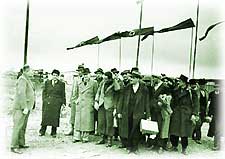Foreign Employment during the Nazi-Regime in Linz
Hermann Rafetseder

The term „foreign employment“ stands for vastly different types of recruitment: from the early volunteers (from western Europe), whose work assumed characteristics of forced labour over time, to brutal deportation and the sight of Ukrainian women lined up in stations as if at a slave market. Furthermore, the term stands for differing forms of contradictory regimentation and real living conditions, which in their turn could, for better of worse, starkly differ from the regulations.
Born of the idea of the „People’s Society“, workers were graded not only according to the racist principles of the Nazi state, but also according to current political motives (which were often difficult to reconcile): the spectrum varied from members of the „Master Race“ of „Germanic“ descent or citizens of allied states, to „Untermenschen“ (lit. sub-humans) of contemptible ethnicity. It becomes clear here what a huge role the behaviour of the beneficiaries played in this central bello-economic (and war-prolonging) sphere: not just the often-cited heavy industry or big business, but also the entrepreneurs in Linz, private homes, and especially also the departments of the Linz City Council, which worked as a nerve centre for “foreign employment“, setting up and running camps, and functioning as an employer and controller of forced labour, etc.